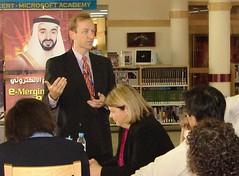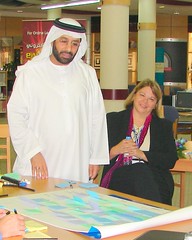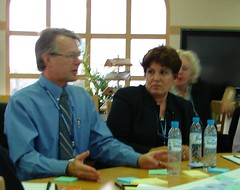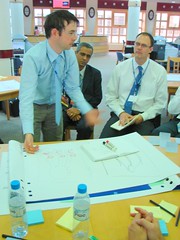Saturday, November 19, 2005
 Ellen Wagner is on the stage talking about designing experiences that are useful, usable, and desirable. She told a story of giving a presentation, retrieving a phone message telling her a blogger in the audience disagreed with her data, and telling the audience she knew someone questioned her data. She seemed prescient when noting that someone was disagreeing.
Ellen Wagner is on the stage talking about designing experiences that are useful, usable, and desirable. She told a story of giving a presentation, retrieving a phone message telling her a blogger in the audience disagreed with her data, and telling the audience she knew someone questioned her data. She seemed prescient when noting that someone was disagreeing.Imagine students fact-checking in real time in the classroom. It levels the playing field between student and teacher. Intellectual parity is on the way.
Note on Jerry Michalski's blog...
I'm in Abu Dhabi at the Higher Colleges of Technology, participating in the eMerging eLearning conference, courtesy of my friend and neighbor Jay Cross.Mobile learning is not elearning on a handheld nor all smart-phones nor games nor always on nor interactive. iPods aren't connected.
Next to me is XPlane's Dave Gray, who just blogged about Jay's post about Macromedia's Ellen Wagner, who just told a story about being blogged during a corporate presentation.
Recursive enough for you?
People want mobile because we are mobile. There’s too much going on to survive without exchanging information on communications.
From Command & Control to Communicate & CollaborateChange in pedagogy we've been looking for is being forced by learning imperatives biult on connectedness, communication, creative expression, collaboration, cultural awareness, and competitiveness.
Flash... to improve the world.
 Clark Quinn is presenting his pitch on Using Technology to Make Us Wise. Clark's a cognitive designer. "Wise people look out not just for themselves, but for all toward whom they have any responsiblity."
Clark Quinn is presenting his pitch on Using Technology to Make Us Wise. Clark's a cognitive designer. "Wise people look out not just for themselves, but for all toward whom they have any responsiblity."Beyond smart: sensible decisions. Long-term. Commpassionate. Empathetic.
What would a wisdom curriculum look like? We're drowning in information and increasing change. It's tough to copy. "The proper study of mankind is the science of design."
Day One of this conference had a number of highs for me. To begin with, I had the honor of welcoming people to the conference and introducing the leader of the educational revolution, His Excellency the Minister of Education, the Chancelor of the Colleges, the Patron of this Event, Sheikh Nahayan Mabarek al Nahayan from the conference room of the most expensive hotel in the world, broadcast on national television.
The next high was the World Cafe. Relecting the tradition of Bedouin hospitality, where any visitor is welcomed into the tent, served coffee, and welcomed into conversation, our World Cafe, actually tables covered with flipchart pads in the middle of the school library, welcomed academics, Emirati, teachers, administrators, and speakers. Here's Jerry, starting the first cafe.

Participants tell me we unearthed some important themes.

Here's Clark Quinn helping people at the cafe articulate the outcomes.

xPlane is creating a visual to explain and continue the conversation.

Today we used the outcomes of yesterday's World Cafe conversations as input into further dialog.
Here's a peek at the Gala Dinner last night. I may even post some video of yours truly dancing the camel dance. Ellen called a friend in the States who heard the Arab band playing. Cacophony. Her friend said, "That sounds like the Arabian Nights." Ellen said, yes, of course it was.



Fabrizio Cardinali, CEO of Giunti Interactive, demonstrates why device convergence would be handy.










3 Comments:
Real-time fact checking does not level the playing field, well, not alone. The issue with the internet is source analysis. To be honest, if we take the internet at face value, one can argue tha the illuminati are in charge, aliens are in the audience with you, and I am a bad person for not lining my baseball cap with foil. A quick thinker and skilled analyst, with access to the web, can make better arguments, but they need those basic skillsets before they even log on.
Real-time fact checking certainly changes the playing field, and I'd argue that it does level it to a certain degree. In my graduate school classes at Berkeley, we are all sitting on the wireless network on our laptops and can fact check if we want to. Rarely do we "fact check" any lengthy discussion or argument that the professor is making because he or she is the expert in the domain and there is less questioning of that. However, basic facts like dates and numbers are easily checked through reliable web sources, and we are usually perceptive enough to recognize reliable versus unreliable sources.
A more interesting question is in what way does real-time fact checking alter the power dynamics of the playing field. Does a professor care if a student corrects him on a claim he has made in lecture? How about a conference presenter or a politician or an elementary school teacher? The power of the speaker is lessened and the interaction becomes many to many rather than one to many.
Yardi, I hear ya, but having a "fact" still requires two things: The ability to wield it, and the ability to defend its source. Like I said, the battlefield isn't going to tip to the side of any student who's trying to bring in the outlandish or the unsupportable -- bad "facts" can ruin any argument, and put the person on the sidelines of the discussion. Likewise, there's still the use of the "fact" that weighs in. Having just the right thing to add, to counter with, to use in an objection is only good as the person's ability to pitch it.
Post a Comment
<< Home